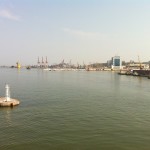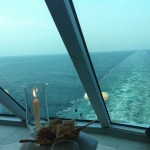
Today was our second day in Odessa, but we stayed on board the ship. It was a time to read and relax and think and connect some of the dots before bidding farewell to the Ukraine.
The wife and I have had the opportunity to travel throughout Europe quite a bit over the last ten years, and one thing that impresses me wherever we go it is the reach and influence of the Roman Empire. We’ve seen the remains of Roman building and culture from Scotland to France to the banks of the Danube and as far away as Israel.
Along the northern coast of the Black Sea where we have been the last four days, the Greeks had settlements and left an imprint. The Romans assimilated Greek culture and added to it a practicality conducive to progress and prosperity. It has been said, “The Greeks had brains; the Romans had drains.”
The Romans had a unique approach to empire. Rather than conquer and destroy, they sought to assimilate. In the ancient world the most significant boast one could make was, “I am a Roman citizen.” The Apostle Paul claimed this privilege. (Acts 22:28).
The Romans thought their empire would last forever. In fact, Rome was referred to as “the Eternal City.” Romans thought they would never be conquered.

It is indeed an act of divine irony then that the Lord decided to plant the flag of the kingdom of God, a kingdom which will truly “never be destroyed” but will “endure forever” (Daniel 2:44), in the midst of the Roman Empire.
The kingdom of God did outlast the Roman Empire and continues to expand. If the physical evidence of the Roman Empire is its ruins, roads and aqueducts, then the physical evidence of the kingdom of God is its churches. And one sees churches just about everywhere one goes.
The reach of the kingdom of God is more extensive than the Romans could have ever imagined and the Kingdom will continue to expand, offering citizenship to those it touches, until it fills the earth. GS

